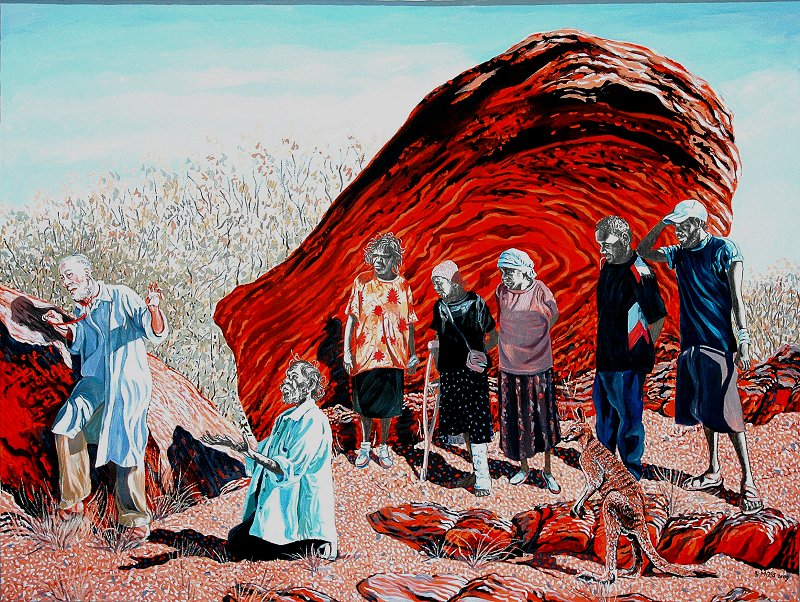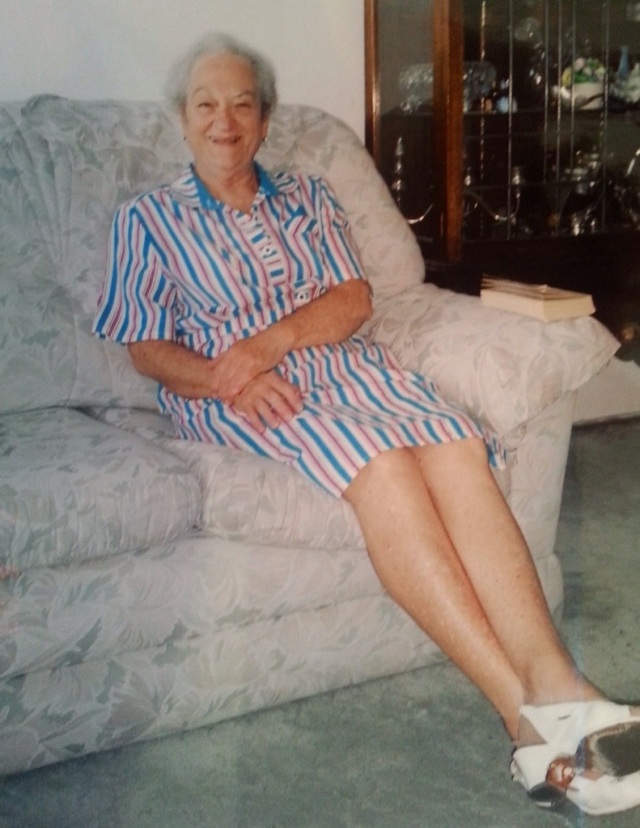I think many families have an aunty who is not really an aunt. That sort of aunt, usually a contemporary of a parent, is a person treasured across generations. You inherit that sort of aunty.
For many of my Jewish school friends in the fifties and sixties that was the only sort of aunt and uncle they knew: their parents’ blood siblings had perished in the gas chambers. Afterwards, close contemporaries were clutched and held closer, people who shared the stories and the memories.
The auntness of Pearly wasn’t woven of that tragic weft. Pearly was the sister of the wife of my father’s brother Abe. The earliest encounter I recall with Aunty Pearly occurred on a winter’s evening at the start of half a year of exile from my home and family. My older brother Dennis and I were to board with Aunty Clare and Uncle Abe in Melbourne, while Dad sold his medical practice in Leeton, our hometown. Transactions of that type take a long time.
The evening was erev shabbat, Sabbath eve, that fulcrum in the week that still finds me emotionally suggestible. The sun set and sank, and with it my mood.
While I enjoyed a period of self-pity – always the sincerest of emotions – our cousins Ruth and Carmel spoke elatedly: “Aunty Pearly’s coming for Shabbat. She always gives us a whole Vanilla Nougat or a Cherry Ripe. Each!
I didn’t know Aunty Pearly. She wouldn’t know me. Vanilla and Cherry and Pearly would be strangers to me. My sincerity deepened.
A knock at the door, a scamper of cousins, gleeful ‘thank you’s, and a deepish womanly voice called: “Where’s Dennis? Where’s Howard?”
Down the short hallway the voice approached, a bulky figure loomed, a smell of perfume, a slash of lipstick, and we were hoisted, one after the other, up into the soft valley between two mountainous breasts. Pearly handed me a Violet Crumble Bar. To Dennis she gave a Vanilla Nougat.
Somehow this stranger knew me, liked me, perhaps even loved me. In that instant I loved Aunty Pearly and the feeling never changed.
When Pearly’s real nephew – a blood nephew – called me early on a Sunday morning sixty years later, his slow agricultural voice had slowed further. “Aunty Pearly just passed away. The funeral will be tomorrow.” The day of Pearly’s passing was filled with celebrations at far ends of a widening clan: there was a Barmitzvah to attend of the grandson of my wife’s cousin and the wedding of the son of my first cousin. Such mixing of significant life moments!
Next day a wintry afternoon found us in a garden burial ground. In this light the grass took on a deeper shade. Black clothing against the green brought a sombre richness.
A crowd, many, many scores of people, gathered. Although some of the names eluded us we all knew each other’s faces from generations of family events. This was a gathering of the many from the fringes of a number of intermarrying clans. Pearlie was one of seven siblings. All of her siblings married and multiplied. Pearlie alone never married: she’d smile and call herself an unclaimed treasure. She treasured her siblings’ children and grandchildren, and their spouses, a growing multitude. But there were non-bloods there as well, numerous as her true kin. Pearlie gathered the young in her wake and we followed her, long after our own youth had gone, to her end. Everywhere eyes shone while mouths smiled, people cradled each other, faces looked serious but not in grief; for aunty Pearly died at the right time – before her dementia could ruin her, her slow cancer suddenly accelerated and she was gone.
Aunty Pearlie led a religious life. Her sacred places were the MCG and the Melbourne Synagogue. She never wavered from the worship of her idols at the Melbourne Football Club. But today it was the curate from her synagogue who led the ceremonies. It was a sweet moment when the young man – no relation to Pearlie or to anyone present – called her “Aunty Pearlie” as we all had. He was another honorary nephew, full of affectionate personal reminiscence. Pearlie’s life of faith ensured she would not be buried by a stranger.
In Aboriginal communities a burial takes place after indeterminate delay long enough for families to scrape the money together for a funeral. Then follows a further chapter of mourning where people gather from across a life history, from across a continent, for the Sorry Business.
Jews are buried with all decent haste. Then our own Sorry Business follows, the precisely calibrated period of shiva when first degree relatives sit low to the floor and receive condolence from their community. But Aunty Pearlie had neither spouse nor children to sit in her honour. Instead we gathered the next two evenings for successive memorial services at her synagogue. Same crowd as at the garden funeral, swollen now, and at a different venue. The Melbourne Synagogue is grand, cavernous, dripping with history, but too often attended by too few. A beautiful shell, the Shule waited for throngs that rarely came. But Aunty Pearlie came, Shabbat after Shabbat, at festival times, at all seasons. Over nearly seven decades she befriended each new rabbi, kept him company in his inevitable disillusion, saw him leave and welcomed and supported his highhoping successor. In this manner Aunty Pearlie outlasted seven Rabbis.
In the course of the Sorry Business I learned more of Pearlie’s growing up in Brisbane, of her service in WWII, of her friendships there with many women and men including a young Zelman Cowen. Pearlie seems to have won and kept many devoted friends.
Poignantly, one who resided so deeply in so many affectionate bosoms left no son to recite the mourning prayer Kaddish for her. Anxiously, I waited to see who might step forward and assume the mantle of the sons who never were. An aged brother in law, still erect, together with his not young son, and a couple of his not young cousins, all recited it together. One or two, more fluent in the Aramaic, led the others as they hobbled and stumbled in and out of time with each other. The four men freighted the feeling and the yearning of us hundreds, all of Aunty Pearly’s “young ones”, all of us wanting hard for her to be sung and storied, lamented and remembered, celebrated in this her holy place. Hundreds of us, all with our personal memories of some moment like mine with a Violet Crumble Bar when I was a child missing a mother’s love.


Love that story about Pearly .She was so warm nana xxx
LikeLike
Nananovic darling
What a lovely surprise to read this
We have been blessed in this family with our old girls
With you, we still are
Xx
Howard
LikeLike
Good on you dear Doc.! I felt as you when I said my goodbyes to my sole remaining sibling, my sister Jo.! last Tuesday at Tewantin Queensland! then we were able to select objects to stick on the coffin, I selected a butterfly.
LikeLike
Ever faithful Bruce
Your loss is much closer, your wound deeper – the brother bond being one of our strongest
I sorrow for you
And I love your final gift to your brother
Howard
LikeLike
Beautiful! My ‘Aunty Pearl’ was my father’s sister – single all her life with a big heart. Her life was devoted from an early age to caring for an invalid mother, and then an invalid aunt, and then an invalid father… she lived with my uncle her older brother who also never married (the Second World War put an end to his engagement). I was the one who had to tell her he had died in hospital. She was in her 80s and for the first time I saw her cry. She sobbed – ‘my big brother, my big brother’. Although our parents outlived her, my sister came to me at her funeral and said “now we are orphans”. That’s what it felt like. She was a community worker, helped establish the Berwick Bush Nursing Hospital, raised money for countless orphans, taught Sunday School, minded children (who all called her ‘Aunty’), was a wonderful cook in a tiny bush cottage kitchen. She taught me to be grateful. Every Christmas she cooked a pudding. In the making of it with her she would tell me, every year, how it took a 100 men (sic) to make this pudding. There were the dairy farmers, the poultry farmers, the men who sowed the wheat for the flour, and the list went on….. and she recited A.A.Milne at the drop of a pin. Thanks Howard…..my day has been lifted because of the memory of our Aunties.
LikeLike
Jan
You always recount a loss to match another’s
Yours is the gift of empathy our brother Morrison lacks
Your tears do our aunties honour
Howard
LikeLike
Such beautiful writing of a celebration of a life.
LikeLike
Pearlie has found a new friend in bmp
Thank you
Howard
LikeLike
A wonderful recounting, Howard – thank you.
LikeLike
Dear M-R
It is a pleasure to write for such an attentive sympathetic reader, herself an eloquent writer
Thank you
Howard
LikeLike
An absolutely beautiful memorial for a lady who sounds absolutely beautiful.
LikeLike
When it comes to the Pearlie sort of beauty you are no ugly duckling yourself, dear Irene
Howard
LikeLike
What a nice thing to say Howard. Thank you very much. Cheers Irene
LikeLike